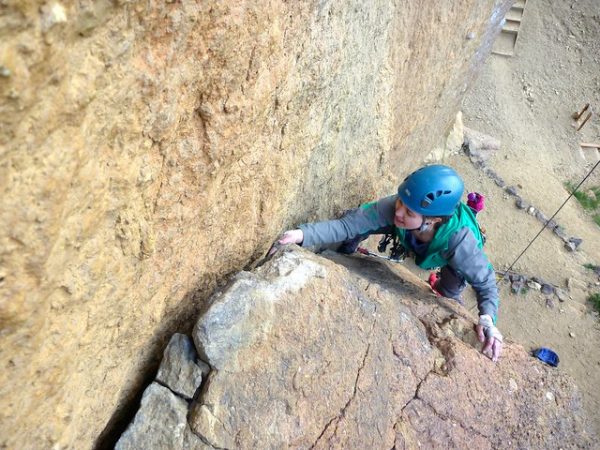
With the recent Oscar win for Free Solo, many students are likely to be interested in rock climbing. Jennifer Wigglesworth’s research and recent post on Engaging Sports about the sexism in rock climbing route names provides a perfect way to think about established concepts using popular culture phenomenon.
This is an interactive activity designed to get students out into their own communities and seeing them with new eyes. During this three-part activity, students will think about history and specifically how naming practices privilege or marginalize certain groups and histories. The activity begins with a critical examination of a pop culture concept — rock climbing — and then asks students to broaden that idea by examining the geography they circulate every day. The lesson concludes with an academic reading on the broader history of imperial naming practices in the United States. This activity would be good for Introduction to Sociology, Sociology of Gender, Race and Ethnicity, Sociology of Sport, Sociology of Culture, Theory, and Urban Sociology.
Materials:
You bring:
- copies of the two suggested readings
- white board and markers for report back and discussion
- physical or virtual map
Students bring:
- copies of the two suggested readings
- notes on what sources they consulted and what they found
The Activity
- Assign Jennifer Wigglesworth’s “What’s in a name? Sexism in rock climbing route names” to be read by students in advance.
- Discuss the reading in class. Focus on students’ reactions. Were they surprised? Upset? Do they feel like there is something about the rock climbing environment that lends itself to these sexist naming practices or have they had similar experiences elsewhere? The discussion does not need to be long but should give students a chance to talk through their feelings about the piece.
- Place students into groups of 4 and assign each group to find 3 local place/site names to research: at least one should be on campus, and at least one should be off campus. You may want to divide up a map. This activity could be done either between class periods, students could leave class during a long class period, or they could do it virtually over the internet. It is ideal if students physically walk or drive around and find the place names to research however so that they are seeing their environment with new eyes.
For each place/site name, each group should answer the following:
- What is the name?
- Who named it? When? What is the history of the name?
- What does the name mean?
- Note: you may want to discuss in advance what sources of information are appropriate for this activity in advance. Because of the local nature of this activity, I would suggest that any source that students can find would be OK (for example, Wikipedia will probably be very helpful) but they should be encouraged to keep track of what sources they consult.
- In class, have each group report back their findings. Probe the groups for any thoughts or reactions. What surprised them? Do not be disappointed at this point if most groups did not notice anything surprising or problematic. Part of the exercise is to discuss why we might not initially find a place name problematic, but as we dig deeper we may find troubling roots.
- Assign students to read C. Richard King’s chapter “De/Scribing Sq*aw: Indigenous Women and Imperial Idioms in the United States,” from Unsettling America, 2013, Rowman and Littlefield, pp 93-106.
- After students have read King’s chapter, use it to revisit the previous two discussions with them. What might the group have missed, and why? Looking at King’s examples, are there local examples that seem less innocuous now? Is there anything in Wigglesworth’s research that parallels the history that King describes? In this discussion, using King’s helpful example of people’s differing awareness and reaction to sq*aw, focus on exploring with students how racism and sexism become embedded in place.
Possible modifications
For methods or other upper level courses, students could be assigned to mimic Wigglesworth’s research and conduct interviews or surveys to understand how people negotiate the meaning of problematic place names in their community.
Additional resources
- The active struggle over Bde Maka Ska/Lake Calhoun in Minneapolis
- Removal of Woodrow Wilson’s name from buildings at Princeton
- Resources for land acknowledgements
Dr. Meghan Krausch studies race, gender, disability, and other forms of marginalization throughout the Americas and in particular how grassroots communities have developed ways to resist their own marginalization. Read more of Meg’s writing at The Rebel Professor or get in touch directly at meghan.krausch@gmail.com.

Comments 1
Lifelong Climber — May 22, 2019
Is it really necessary to make EVERYTHING political?
People climb because it is fun, good exercise, mentally and physically challenging. It also creates lifelong friends - of both sexes.
Don't ruin a great sport by politicising it!